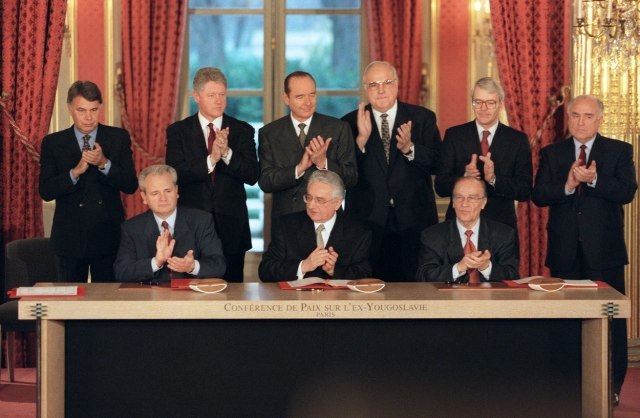26 years of Dayton Peace Agreement
Today we mark the 26th anniversary of the signing of the Dayton Peace Agreement, which was signed on December 14, 1995 in Paris.
Tuesday, 14.12.2021.
08:15

26 years of Dayton Peace Agreement
The agreement was previously initialed on November 21 at the Wright Peterson U.S. military base in the small town of Dayton, Ohio.Sarajevo and Banja Luka are celebrating this anniversary of the signing of the Dayton Agreement, which stopped the civil war in Bosnia-Herzegovina, in ever more tense relations. Tensions escalated after former High Representative to BiH Valentin Inzko imposed amendments to the criminal law banning denials and sanctioning denials of genocide in Srebrenica in late June this year. As counter-measure, the National Assembly of the Republika Srpska immediately adopted conclusions according to which the Serbian representatives withdrew from decision-making in the state institutions of Bosnia-Herzegovina, which practically blocked their work.
Republika Srpska, which insists on respecting the Dayton Agreement in its original form, on Friday reached a conclusion on returning competencies in the field of army, tax policy and justice from the state to the entity level, which provoked reactions from international and domestic factors, primarily Bosniaks, who are asking High Representative Christian Schmidt to immediately reverse those conclusions.
Dodik is of the opinion that the Republika Srpska has been deprived of the competencies that belong to it under the Dayton Agreement for years, and that Srpska will peacefully advocate for the return of the rights and justice provided by the Constitution (BiH). He insists that the Republika Srpska has included its country, territory, its people and government in the Dayton Agreement, and that it only wants to keep the Dayton principles.
The embassies of the western countries strongly condemned the decisions of the NARS on the return of state competencies to the entity, and the Federation of BiH called on the Prosecutor's Office of BiH to protect the constitutional order of BiH.
Analyst Obrad Kesić assessed that the conclusions of the National Assembly of the Republika Srpska (NARS) present the first step towards the abolition of illegal decisions of high representatives and the return of competencies that belong to this entity according to the Dayton Agreement. In a statement for Tanjug, Kesic said that this was also the first step towards a possible agreement in Bosnia and Herzegovina, on the basis of which a highly decentralized state will be built, based on the Dayton Agreement.
Kesic specified that a highly decentralized state means that two entities and ten cantons in the Federation of BiH have broad competencies and authority, and are key factors for the functioning of a common state. The Dayton Agreement was signed in Paris by the first president of independent BiH, Alija Izetbegovic, the first president of independent Croatia, Franjo Tudjman, and the president of the then FRY and Serbia, Slobodna Milosevic, at a ceremony at the Élysée Palace, officially ending the war in Bosnia-Herzegovina.
The signatories undertook to regulate mutual relations according to the UN Charter, the Helsinki Final Act and other OSCE documents, as well as mutual respect for sovereignty and resolving disagreements in a peaceful manner. One of the most basic principles on which the Dayton Agreement was based was the division of BiH according to the key 51 percent of the territory to the Federation of BiH and 49 percent to the Republika Srpska, along with the Brcko District, which was agreed by the Contact Group.
By the end of 1992, Serbs held 70 percent of the territory of Bosnia and Herzegovina, Croats about 17 percent, and Bosniaks 13 percent.
The Dayton Accords gave the entities great powers and indicated the basic powers of joint state bodies. However, not long after, the question arose as to whether the solutions defined in this act, which ended the war, were sustainable in a peaceful future.
The discussion on the necessity or inadmissibility of redefining this agreement continues to this day. According to the Dayton Agreement, the High Representative for BiH is the supreme interpreter of Annex 10 of the Dayton Peace Agreement on behalf of the UN and the EU.
He is appointed by the UN Security Council on the proposal of the Steering Board of the Peace Implementation Council (PIC). That is why the Republika Srpska does not recognize the current High Representative Schmidt, because he was not appointed to the UN Security Council.






























Komentari 0